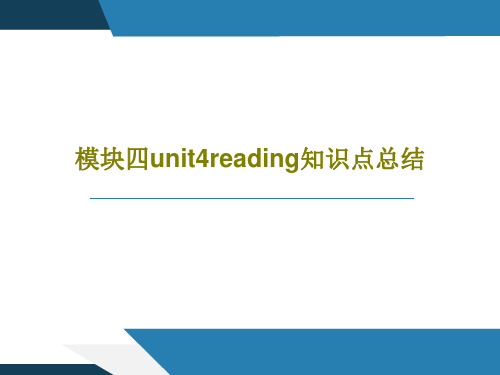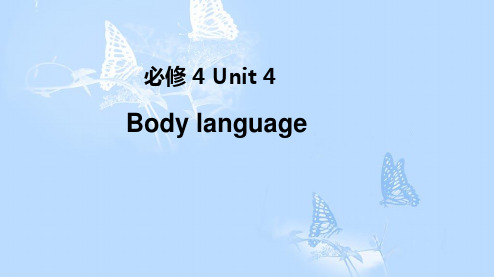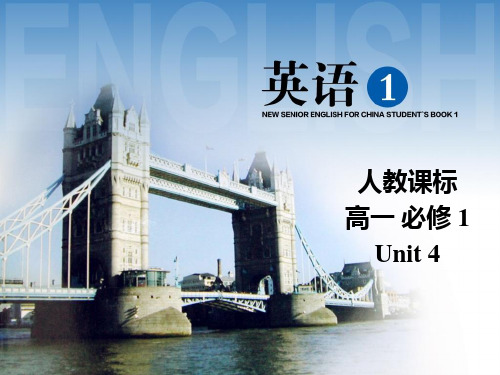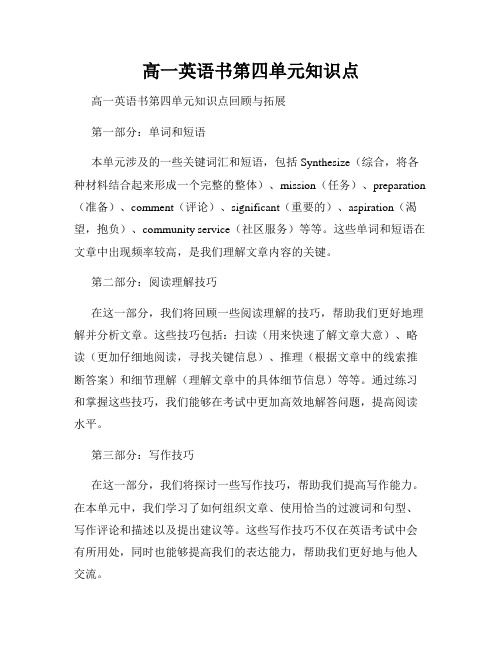高一英语第四单元reading知识点归纳
模块四unit4reading知识点总结共51页

1、纪律是管理关系的形式。——阿法 纳西耶 夫 2、改革如果不讲纪律,就难以成功。
3、道德行为训练,不是通过语言影响 ,而是 让儿童 练习良 好道德 行为, 克服懒 惰、轻 率、不 守纪律 、颓废 等不良 行为。 4、学校没有纪律便如磨房里没有水。 ——夸 美纽斯
43、重复别人所说的话,只需要教育; 而要挑战别人所说的话,则需要头脑。—— 玛丽·佩蒂博恩·普尔பைடு நூலகம்
44、卓越的人一大优点是:在不利与艰 难的遭遇里百折不饶。——贝多芬
45、自己的饭量自己知道。——苏联
5、教导儿童服从真理、服从集体,养 成儿童 自觉的 纪律性 ,这是 儿童道 德教育 最重要 的部分 。—— 陈鹤琴
41、学问是异常珍贵的东西,从任何源泉吸 收都不可耻。——阿卜·日·法拉兹
42、只有在人群中间,才能认识自 己。——德国
人教版高一英语 必修 4 Unit 4 reading 知识点总结(51张)

(2)representation n.
表现;描述,描绘
(3)representative n.
代表
adj. 典型的,有代表性的
[温馨提示] 同义词表示“代表”:on behalf of, stand for。
【活学活用】 (1)The museum had several paintings representing the artist's early style. 博物馆藏有几幅代表这个艺术家早期风格的油画。 (2)The chairman represented the importance of the bill to the audience. 主席向听众说后置定语 ___T__h_e__fi_r_s_t_p_e_r_s_o_n__t_o_a_r_r_i_v_e___ (第一个到达的人) was Tony Garcia from Colombia, closely followed by Julia Smith from Britain. 2.not all…表示部分否定,意为“并非所有的” ___N__o_t_a_l_l_c_u_l_t_u_r_e_s_g_r_e_e_t__e_a_c_h__o_th__e_r_t_h_e__sa__m_e__w__a_y____ (各种文化背景下的人互致问候的方 式不尽相同), nor are they comfortable in the same way with touching or distance between people.
(3)语法填空。 ①The subject is so difficult;I really don't know how to represent it___t_o___ you. ②The study was carried out in one small town, so we couldn‘t be sure that the results were truly _r_e_p_r_e_s_e_n_t_a_t_iv_e___(represent). ③The competition attracted over 500 players___r_e_p_r_e_s_e_n_t_i_n_g____ (represent) eight different countries.
高一英语必修一Unit 4 earthquake reading A night the earth didn't sleep 知识点

1) There is a clothes shop a_t__th_e__e_n_d_o_f_ the street 2) They gave up the plane_i_n_t_h_e__en__d_. 3) How many English words had you
learned _b_y__th_e__e_n_d_o_f_ last term?
as if 用虚拟语气的情况
与过去事实相反 与现在事实相反 与将来事实相反
从句谓语
had done 过去完成时 were/did 过去式
would/could/might + 动词原形
At an end 意为“结束终 止”在句中多用作表语。
1、战争结束了。 The war was at an end. 2、他继续大把的用钱直到用完 为止。 He went on spending freely until his money was at an end.
用burst或其短语的适当形式填空。 1. The plane crashed and _b_u_r_s_t _in__to_ flames.
(坠落)
2. The dam _b_u_r_s_t because of the heavy rain.
4. Everyone was quiet when John suddenly _b_u_r_s_t_o_u_t_ laughing.
It seemed as if the world was at an end! 这是一个复合句。主句是 _I_t_s_e_em__e_d_, as if 引导表语从句 【翻译】 世界似乎到了末日!
as if 在表语从句中相当于that = It seemed that the world was at an end!
模块四unit4reading知识点总结51页PPT

பைடு நூலகம் 谢谢
11、越是没有本领的就越加自命不凡。——邓拓 12、越是无能的人,越喜欢挑剔别人的错儿。——爱尔兰 13、知人者智,自知者明。胜人者有力,自胜者强。——老子 14、意志坚强的人能把世界放在手中像泥块一样任意揉捏。——歌德 15、最具挑战性的挑战莫过于提升自我。——迈克尔·F·斯特利
模块四unit4reading知识点 总结
26、机遇对于有准备的头脑有特别的 亲和力 。 27、自信是人格的核心。
28、目标的坚定是性格中最必要的力 量泉源 之一, 也是成 功的利 器之一 。没有 它,天 才也会 在矛盾 无定的 迷径中 ,徒劳 无功。- -查士 德斐尔 爵士。 29、困难就是机遇。--温斯顿.丘吉 尔。 30、我奋斗,所以我快乐。--格林斯 潘。
高一必修一reading知识点

高一必修一reading知识点Reading是英语学习的重要组成部分,通过阅读我们可以提高词汇量、理解能力和阅读速度。
高一必修一的Reading部分主要包括课文内容和相关知识点。
下面将按照学习的顺序,简要介绍高一必修一Reading的知识点。
第一单元:The world in the future(未来的世界)本单元主要讲述未来的世界,包括科技、气候变化和环境等方面。
在阅读中,我们需要关注相关词汇,如technology(技术)、global warming(全球变暖)和pollution(污染)等。
同时,还需要学习一些重要的语法结构和句型,如条件句和固定短语。
第二单元:The Olympic Games(奥运会)本单元介绍了奥林匹克运动会的起源、发展和特点。
在阅读中,我们需要了解一些关于奥运会的常用词汇,如medal(奖牌)、athlete(运动员)和venue(场馆)等。
此外,还需要掌握一些表示时间、顺序和比较的词语和句型。
第三单元:English around the world(世界英语)本单元主要探讨了英语在世界各地的使用情况和变化。
在阅读中,我们需要了解有关英语的语言特点、使用范围和影响等内容。
词汇方面,我们需要注意一些描述语言变化和多样性的词汇,如dialect(方言)、accent(口音)和bilingual(双语的)等。
第四单元:Music(音乐)本单元介绍了音乐的不同类型、艺术家和音乐家等内容。
在阅读中,我们需要理解音乐方面的相关词汇,如genre(类型)、composer(作曲家)和instrument(乐器)等。
除此之外,还需要注意一些词汇和短语的用法和搭配。
第五单元:Health(健康)本单元围绕健康生活方式和相关的问题展开阐述。
在阅读中,我们需要理解与健康有关的词汇和短语,如exercise(锻炼)、balanced diet(均衡饮食)和stress(压力)等。
另外,还需要掌握一些表示原因和结果的语法结构。
高一英语书第四单元知识点

高一英语书第四单元知识点高一英语书第四单元知识点回顾与拓展第一部分:单词和短语本单元涉及的一些关键词汇和短语,包括Synthesize(综合,将各种材料结合起来形成一个完整的整体)、mission(任务)、preparation (准备)、comment(评论)、significant(重要的)、aspiration(渴望,抱负)、community service(社区服务)等等。
这些单词和短语在文章中出现频率较高,是我们理解文章内容的关键。
第二部分:阅读理解技巧在这一部分,我们将回顾一些阅读理解的技巧,帮助我们更好地理解并分析文章。
这些技巧包括:扫读(用来快速了解文章大意)、略读(更加仔细地阅读,寻找关键信息)、推理(根据文章中的线索推断答案)和细节理解(理解文章中的具体细节信息)等等。
通过练习和掌握这些技巧,我们能够在考试中更加高效地解答问题,提高阅读水平。
第三部分:写作技巧在这一部分,我们将探讨一些写作技巧,帮助我们提高写作能力。
在本单元中,我们学习了如何组织文章、使用恰当的过渡词和句型、写作评论和描述以及提出建议等。
这些写作技巧不仅在英语考试中会有所用处,同时也能够提高我们的表达能力,帮助我们更好地与他人交流。
第四部分:听力技巧在本单元中,我们学习了一些常用的听力技巧,帮助我们更好地理解听力材料。
这些技巧包括:预测(在听力开始前借助标题和图片预测材料内容)、关键词(听力过程中记住关键词,以便理解整体意思)和推测(通过上下文推测听力内容)等等。
通过不断的听力训练,我们能够提高我们的听力水平,更好地应对听力考试。
第五部分:语法和词法本单元中涉及的一些重要语法和词法知识点包括:虚拟语气、状语从句、非限制性定语从句、形容词和副词的比较级和最高级等。
通过对这些知识点的复习和掌握,我们能够更准确地使用英语,增强语言表达能力。
第六部分:口语表达技巧在这一部分,我们将学习一些常用的口语表达技巧,帮助我们提高口语表达能力。
高一英语必修一Unit4reading知识点讲解(1)

②Get the Ss t ater the usage f the pattern:s It seeed that the rld as at end All hpe as nt lst 2 Abilit Ais:
T iprve Ss’ abilit f reading Learning diffiult pints: 1 Let the Ss learn theusage f the rds “ shae ” 2 Enable the Ss t aster the usage f the pattern ---- is nt---”and understand se diffiult
高一英语必修一 Unit 4 reading 知识点讲解 (1)
时间: _2009 年_ 10 月 11 星期
日 制作人 :北大附中河南分校 王萍
Learning Ais: 1 nledge Ais: ① Enable the students t grasp the usages f suh iprtant ne rds and expressin_r_rs as shae, inure, destr, s, resue, right aa, a great nuber f, give ut, et
“ห้องสมุดไป่ตู้all
And lng sentene
教学过程: Step ͌ Leading-in (3 分钟 ) 1 Greet Ss as usual 2 En the 3-inute’s tal sh and give the ent n it Free tpi
Then nt it
StepT.Preparatin:(3-分钟) 1 Read the aring-up ludl and find the rds the a’n t read 2 Read the paragraph ludl and tr t find the diffiult pints aring-up Iagine ur he begins t shae and u ust leave it right aa 知识点:
牛津英语高一Unit4-more-reading语言点

• save v. 1) = make or keep sb./ sth. safe 挽救,拯救
eg. to save sb.’s life / sb. from drowning…
sa2v)e=skbe.’esplmifeoney or sth. for future use 存钱,省下,留下 eg. stobs.afvroe mpadrtroofwonnien’gs salary for a new bicycle Save strength for hard work you’ll do later.
• mystery 1) = the thing of which the cause or origin is hidden or impossible to explain 神秘事物,秘密
eg. mysteries of life Why he went there is a mystery to me. 2) = the condition of being secret or obscure 神秘 eg. The origin of this tribe is lost in mystery. An air of mystery surrounded the events leading up to his death. mystery stories / stories full of mystery a. mysterious crime/ parcel/ event / look/ plan ad. The main witness had mysteriously disappeared. Mysteriously, there was no answer when I rang.
- 1、下载文档前请自行甄别文档内容的完整性,平台不提供额外的编辑、内容补充、找答案等附加服务。
- 2、"仅部分预览"的文档,不可在线预览部分如存在完整性等问题,可反馈申请退款(可完整预览的文档不适用该条件!)。
- 3、如文档侵犯您的权益,请联系客服反馈,我们会尽快为您处理(人工客服工作时间:9:00-18:30)。
高一第四单元reading知识点归纳
1.happen 发生不能用于被动语态。
其用法如下:
①sth happen to sb 某人出了某事(通常为不好的事情)例:She hopes nothing bad would happen to him.她不希望有坏事发生在他身上。
②happen to do sth 碰巧做某事此种搭配不用于进行时,例:I happened to be there when the fire started.火灾发生时我碰巧在那儿。
③It so happens/happened that ……碰巧……例:It so happened that the famous actor was her brother.碰巧那位著名演员是她的哥哥。
例:Eliza remembers everything exactly as if it___ yesterday.
A. was happening
B. happens
C. has happened
D. happened
2. rise vi. rose, risen
上升; 升起; 上涨; 升高; 增加
raise vt . raised , raised.
举起, 抬起,喂养
○1He _____from his chair when the door bell rang.
○2Her job is _______ chickens.
3. too……to……太……而不能……(表否定意义)
例: Tom is too young to go to school.
too……to……句型在下列情况下表示肯定意义:
①与某些表示心情的词和描述性的词连用时,如happy,glad,pleased, nervous,willing,eager等。
I am too glad to see you.
②too 前有only, but, all, never,can’t 时
We are only too happy to live in China. It’s never too late to learn.
You can never be too careful.
4. think little of……对……评价不高,不重视
The teacher thought little of your article.老师对你的作文评价不高。
think much/highly/well of 对……高度评价
例:Generally speaking, not all political leaders were____ by people.
A. good thought of
B. well thought of
C. good thought
D. well thought
5. cut across 横穿
In order to provide electricity to the faraway village, they set up a special line which cut across five hills.
为了给遥远的村庄供电,他们横穿五个小山架了一条特殊的线路。
cut in 插入;打断
He always cuts in while other people are talking.
别人说话时他总爱插嘴。
6. 有百分数或分数修饰的结构作主语时,谓语动词要根据百分数或分数所修饰的是可数名词还是不可数名词而定。
50% of the students in our class are girls.
我们班50%的学生是女生。
Two thirds of the earth surface is covered with water.
地球表面的三分之二是水。
例:Nearly one-third of the teachers in our school ___ from other cities in the past.
A. is
B. are C .was D. were
7. All hope was not lost. 不是所有的希望都破灭了。
部分否定的表达方式
not与all(三者或三者以上)/both(两者之间)/everyone/everybody/everything/every+n./each/each+n.连用时,不管not在它们之前或之后都表示部分否定。
例:Both of them haven’t read this story.=Not both of them have read this story. 他们两个人并非都读过这个故事。
Not all the students obey the school rules.= All the students don’t obey the school rules. 并非所有的学生都遵守校规。
注意:表达全部否定时通常要把这些具有总体意思的词改为相应的否定词,如:none,neither,nothing,nobody,no等。
Attributive Clause(定语从句)
在复合句中,修饰某一名词或代词的从句叫做定语从句。
它分为:限制性定语从句和非限制性定语从句。
被定语从句所修饰的那个词称为先行词。
引导词
关系代词:which, that, who, whom, whose,
as(在句中充当成分,可作主语,宾语,表语,定语)
关系副词:when, where, why,在句中只作状语。
He is a teacher who likes singing songs.
关系词只用that不用which的情况:
(1)当先行词是all, everything, nothing, something, anything, little, much 等不定代词时或被all, every, no, some, any, little, much, few, only等修饰时. (2) 先行词被序数词或最高级修饰时。
(3)先行词被the only, the very, the same, the last,just the等修饰时。
(4)当并列的两个先行词分别表示人或物
(5) 先行词是who或who引导的主句。
(6) 当先行词在定语从句中作be表语時
(7)当主句是which引导的特殊疑问句时
只用which不用that的情况:
(1)引导非限制性定语从句时
(2)关系代词指物,做介词宾语时
1. The girl __________ is sitting in the chair is a good singer.
2. The skirt __________ Mary bought two years ago is old.
3. Is this the novel __________ you introduced to me?
4. Where is the boy _______ broke the window?
5. Luckily none of the people_________I know were killed in the earthquake.。
